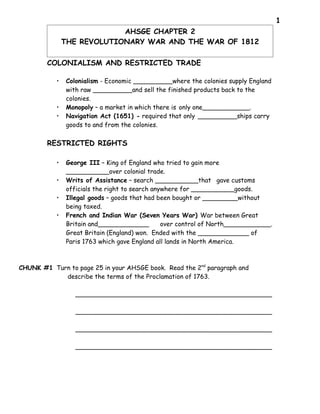
AHSGE Social Studies -chapter 2 Student Notes
- 1. 1 AHSGE CHAPTER 2 THE REVOLUTIONARY WAR AND THE WAR OF 1812 COLONIALISM AND RESTRICTED TRADE • Colonialism - Economic __________where the colonies supply England with raw __________and sell the finished products back to the colonies. • Monopoly – a market in which there is only one____________. • Navigation Act (1651) - required that only __________ships carry goods to and from the colonies. RESTRICTED RIGHTS • George III – King of England who tried to gain more ___________over colonial trade. • Writs of Assistance – search ___________that gave customs officials the right to search anywhere for ___________goods. • Illegal goods – goods that had been bought or _________without being taxed. • French and Indian War (Seven Years War) War between Great Britain and_____________ over control of North____________. Great Britain (England) won. Ended with the _____________ of Paris 1763 which gave England all lands in North America. CHUNK #1 Turn to page 25 in your AHSGE book. Read the 2nd paragraph and describe the terms of the Proclamation of 1763. __________________________________________________ __________________________________________________ __________________________________________________ __________________________________________________
- 2. 2 • Proclamation of 1763 – Colonists were not allowed to move west of the ______________Mountains so as to not upset the Native Americans. TAXATION WITHOUT REPRESENTATION • Colonists were not allowed to have representatives in the British ______________so each tax became law without their consent. • Sugar Act – Tax on ____________and was strictly enforced. • Stamp Act – created a tax on all ____________items, legal documents, playing cards etc. First tax placed ____________on the colonists. • Sons of Liberty – secret group of colonists who came together to organize a ____________of British goods. • Boycott –_____________to buy goods. • Daughters of Liberty – colonial women who ___________their own cloth so they would not have to buy it form Britain. • The Townshend Acts – Tax on__________, paper, lead and tea. British soldiers could also ____________any home, building or ship with the authority of _____________of assistance. OTHER EVENTS LEADING TO COLONIAL SEPARATION • Crispus Attucks – a free ___________sailor who was active in the Sons of Liberty. Killed during the ___________Massacre. • Boston Massacre – Incident in Boston, MA where British soldiers fired on a crowd and killed _________colonists. • Boston Tea Party – Members of Sons of Liberty who dressed as ___________Americans and dumped tea into the _________Harbor. • Patriots – colonists who wanted ___________from Britain. • Intolerable Acts –_________down Boston Harbor, limited town meetings to one per year, forced colonists to house ____________soldiers, British officers would be tried in England. Called __________Acts by Parliament. • First Continental Congress (1774) – agreed to __________all British goods and to stop exporting goods to England until acts repealed. THE REVOLUTIONARY WAR BEGINS • Patrick Henry – “Give me liberty or give me death” (would rather be dead than stay under __________rule); speech helped convince _______________leaders to fight for independence. • Minutemen- _____________soldiers who were ready to fight at a moment’s notice.
- 3. 3 • Paul Revere – road on _____________warning colonists “The British are coming!” before the conflict at _______________and Concord. • Second Continental Congress – Held to discuss what to do about the war______________. • Battle of Bunker Hill –_____________victory for colonists. British had huge number of casualties. Patriots lost because they were out of________________. • George Washington – commander of the _______________Army. • Prohibitory Act – King George III’s statement that colonies were in a state of _____________and considered traitors to England. DECLARATION OF INDEPENDENCE • Declaration of Independence – Justified ___________for colonial independence from Great Britain. • Foundation – basis for the new American ____________that guaranteed life, liberty and the pursuit of____________. • Principles – – All men are ____________equal – All people are guaranteed their ___________rights (rights given at birth) – Government exists only by the consent of the___________. – Government must be change if it becomes ___________(unfair). • Thomas Jefferson wrote the Declaration of ____________and it was signed on July 4, 1776. MAJOR BATTLES OF THE REVOLUTIONARY WAR CHUNK #2 Turn to page 29. Read Major Battles in the Revolutionary War. Fill out the graphic organizer below by naming the significance of each battle or incident. Bunker Hill Lexington and Concord Major Battles in the Revolutionary War Saratoga Yorktown Valley Forge 4
- 4. 4 • Battles of Lexington and Concord – 1st battle of the _____________War. • Battle of Bunker Hill – see previous notes. • Battle of Saratoga –_____________point in the war. After this victory, the ______________decided to send troops to help the colonists. • Valley Forge – Low point for the Continental Army. ______________winter where thousands died of _____________and exposure. • Yorktown – Last battle of the Revolutionary War. _____________surrendered. TREATY OF PARIS • Treaty of Paris 1783 – Britain recognized the independence of the United States and its borders. U.S. now owns all land to the _______________River. THE WAR OF 1812 Reasons why the U.S. and England go back to war again… Impressment – the act of taking sailors from United States shops and forcing them to serve in the British or ____________Navy. Embargo – prohibiting entry or departure of ships. • “War Hawks” –_______________from the South and the West who supported war with Britain. • James Madison – President during the War of___________. • Battle of Horseshoe Bend – Andrew Jackson defeated the Creeks with the help of the______________. Creeks had to give up much of their land to the U.S. IMPORTANT BATTLES OF THE WAR OF 1812 • Battle of Fort McHenry – Battle where _____________Scott Key wrote “The Star Spangled Banner” (national____________). • Treaty of Ghent – ended the War of 1812. _____________of U.S. stayed the same. Nothing changed. • Battle of New Orleans – Battle fought after the treaty was signed. _____________victory over British troops. Made Andrew Jackson a___________. CONSEQUENCES OF THE WAR • Nationalism – Feelings of extreme pride and devotion for one’s country. _______________grew in the U.S.